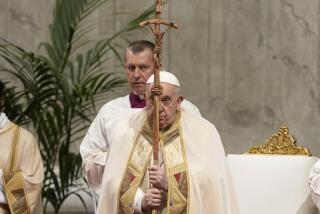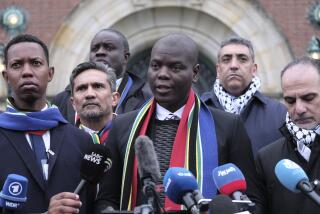Pope Moves to Resolve Holocaust Blame
ROME — As Pope John Paul II charts the course for the Catholic Church in the coming millennium, he is preparing to resolve a painful but significant chapter of this century--the Church’s conduct toward Jews during the Holocaust.
For the past seven years, the Pope and the Vatican have consulted with scholars from around the world to address what remains one of the most troubling events of modern times.
The Pope, who witnessed the Holocaust in Poland and has characterized it as a personal tragedy, is expected to make a final determination next year on the controversial and complicated relationship between the Church and European Jews, 50 years after the end of World War II.
By most accounts, the task will not be easy. What’s more, even a definitive word will surely not be the last on the subject.
The move to resolve the volatile question comes as the relationship between Jews and the Church is improving. A year ago, diplomatic ties were established between the Vatican and Israel.
Despite what they consider some questionable diplomatic moves by the Vatican, many Jewish leaders have expressed fondness for the Pope, who refers to Jews in his recently published book, “Crossing the Threshold of Hope,” as “our elder brothers in the faith.”
Tullia Zevi, president of Italy’s Jewish Community, called the Pope “courageous” for undertaking the study and said, “In my opinion, he has been very positive for our improved relations. He’s a Pole and you feel like he has seen it all.”
Born Karol Wojtyla and reared in Wadowice, near the Czech border--where 2,000 of the 9,000 residents were Jewish--he witnessed deportations and the death of friends. He lived in the shadow of Auschwitz, which, he wrote, “To this day . . . does not cease to admonish, reminding us that anti-Semitism is a great sin against humanity.”
He has expressed revulsion over the genocide and acknowledged the “sinfulness” among some Catholics.
But the Pope has remained silent on the red-hot question--whether the Roman Catholic Church was responsible for sowing an atmosphere of hate against the Jews, in which its followers and servants found comfort and justification.
The question of which way the Pope will turn is playing out among church leaders who are deeply divided over how, or even whether, to address this issue. At the center of the vast and polarized landscape of opinion stands Pope John Paul II, whose personal views and experiences are clear but for whom the epoch will require passing judgment on the church he leads.
Many German and Polish clerics, who, like the Polish-born Pope, witnessed the Holocaust, strongly promote a confession of guilt. Other Europeans and officials in the Vatican bureaucracy known as the curia, oppose a blanket condemnation. They say there is no proof that the Church actively supported or sympathized with the Nazis and contend that the Vatican worked to halt the genocide.
Agreement can be found on one point--untold numbers of Catholics risked their livelihood and their lives to save Jewish friends, neighbors and strangers.
“There is no question that Catholics risked their lives,” said Norbert Greinacher, a leading German Catholic theologian. “But for the official church in the mainstream this was not true.”
Greinacher said anti-Semitic sermons were a mainstay in churches during the war and prayers against the Jews for the killing of Jesus often fed the flames of hatred. He noted that Catholic bishops in Germany and Poland were openly hostile to Jews.
But Robert Graham, a Jesuit priest in Rome who has studied the Church’s behavior during the war years, contends that time has blurred reality. The Vatican was responsive to requests by Jewish groups to help end persecution, he said. It sought visas for Jews and helped to plan escape routes and hiding places.
“All the big Jewish organizations were involved with the Vatican and were greatly appreciative,” he said. “I find it unfair that there’s a systematic blindness to the Vatican’s role during that time. There was a lot of goodwill toward the Vatican then.”
Today, some of the most vocal critics of the Church’s behavior during the war are not Jewish groups but Catholics.
A working paper on the subject prepared by a German theologian said the Church was partly responsible for the Holocaust. The paper was undertaken at church request, but caused a sensation when it was leaked to the press.
Prepared by Hans Herman Henrix, of the Catholic Theological Institute in Aachen, Germany, the paper said: “Despite the exemplary behavior of some individuals and groups, we were nevertheless as a whole a church community who kept on living their lives in turning their back too often on the fate of this persecuted Jewish people . . . and who remained silent about the crimes committed against the Jews and Judaism.”
The Vatican immediately distanced itself from the study, saying it was a project of the German Bishops’ Conference and the Polish Bishops’ Conference.
But Henrix said the Pope has been supportive of the project, which is expected to be completed in 1995. “I have not lost confidence that the result of this process will be helpful to the relationship of the Church and the Jewish community,” he said.
More to Read
Sign up for Essential California
The most important California stories and recommendations in your inbox every morning.
You may occasionally receive promotional content from the Los Angeles Times.









